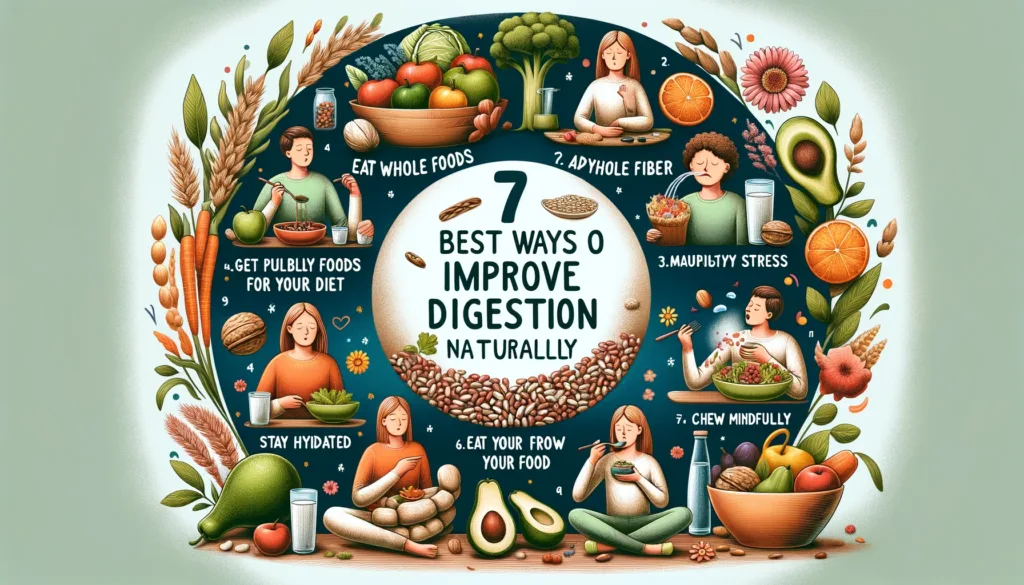Understanding Natural Digestion Improvement
Your digestive system is complex, involving various organs working in harmony. Improving it naturally involves a holistic approach, encompassing diet, lifestyle, and mental health.
The Importance of Hydration
Water’s Role in Digestion
Water is essential for healthy digestion. It aids in breaking down food, absorbing nutrients, and eliminating waste. Drinking adequate water can prevent constipation and maintain a healthy gut.
Balanced Diet and Digestive Health
Fiber-Rich Foods for Gut Health
Incorporating fiber-rich foods like fruits, vegetables, and whole grains promotes healthy bowel movements and prevents digestive disorders. Fiber also feeds beneficial gut bacteria, crucial for digestion.
Probiotics and Gut Flora
Probiotics found in fermented foods like yogurt and kimchi enhance gut flora. A balanced microbiome is vital for effective digestion and overall health.
Mindful Eating Practices
Chewing and Digestion
Proper chewing is the first step in digestion. It breaks down food and makes nutrients more accessible. This can alleviate digestive discomfort and improve nutrient absorption.
Eating Slowly for Better Absorption
Eating slowly allows enzymes in your mouth to start the digestive process effectively. It also prevents overeating and digestive distress.
Regular Physical Activity
Exercises for Gut Health
Regular exercise keeps the digestive system active and efficient. Activities like walking and yoga can stimulate bowel movements and reduce bloating.
The Impact of Movement on Digestion
Physical movement aids in moving food through the digestive tract. It also reduces stress, which can negatively impact digestion.
Stress Management for Digestive Wellness
Relaxation Techniques for Gut Health
Stress management is essential for digestive health. Practices like meditation and deep breathing exercises can reduce gut inflammation and improve digestion.
Herbal Remedies and Digestion
Natural Herbs for Digestive Health
Herbs like ginger, peppermint, and fennel have been used for centuries to aid digestion. They can alleviate symptoms like bloating, gas, and stomach cramps.
Understanding Food Intolerances
Identifying and Managing Sensitivities
Recognizing and managing food intolerances is crucial for digestive health. Eliminating or reducing trigger foods can alleviate symptoms like bloating, gas, and diarrhea.
The Role of Prebiotics in Digestion
Sources and Benefits of Prebiotics
Prebiotics, found in foods like garlic, onions, and bananas, feed good bacteria in your gut. They are vital for maintaining a healthy digestive system.
Limiting Processed Foods
The Impact of Processed Foods on Digestion
Processed foods are often low in fiber and high in additives, which can disrupt digestion. Reducing their intake can significantly improve digestive health.
Healthy Fats and Digestive Health
Types of Fats for Optimal Digestion
Healthy fats, like those found in avocados, nuts, and olive oil, are beneficial for digestion. They help in nutrient absorption and maintaining a healthy gut lining.
Adequate Sleep and Digestive Health
The Connection Between Sleep and Digestion
Quality sleep is crucial for digestive health. Poor sleep can disrupt the digestive process and lead to issues like acid reflux and indigestion.
Conclusion
Improving your digestion naturally involves a combination of dietary changes, lifestyle adjustments, and stress management. By following these 11 steps, you can achieve better digestive health and overall wellness.
FAQs
- How much water should I drink daily for healthy digestion?
- Can exercise replace medications for digestive issues?
- Are there any specific foods to avoid for better digestion?
- How does stress affect my digestive system?
- What are the signs of an unhealthy gut?
- How can I tell if I have a food intolerance?





